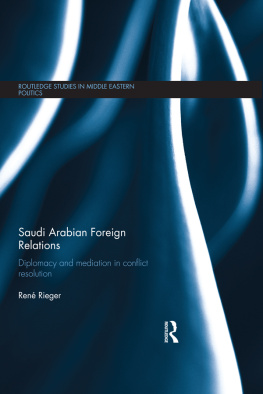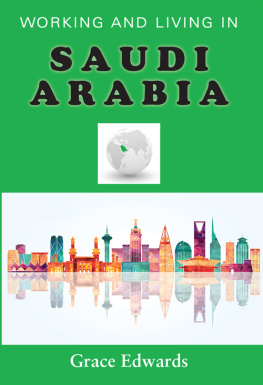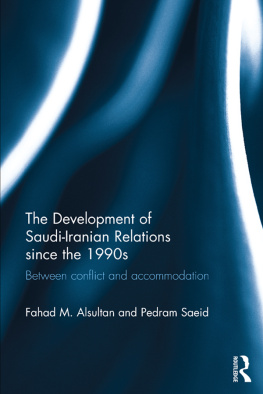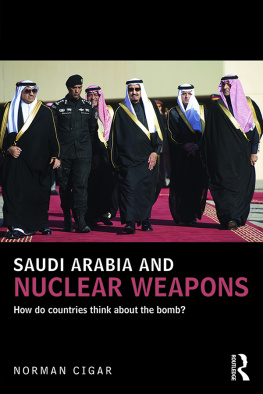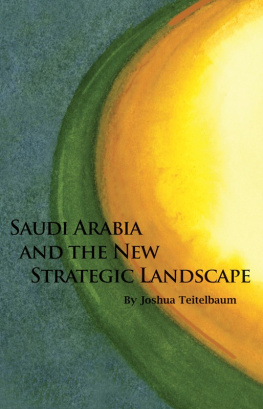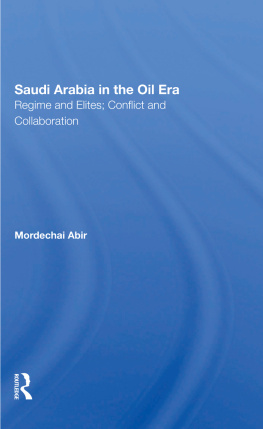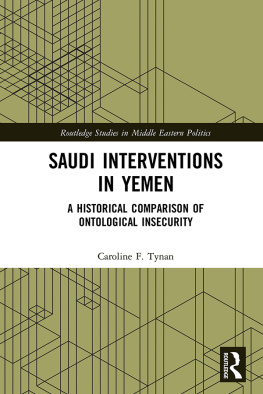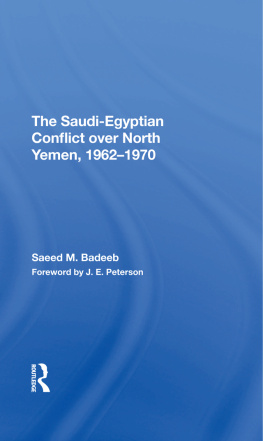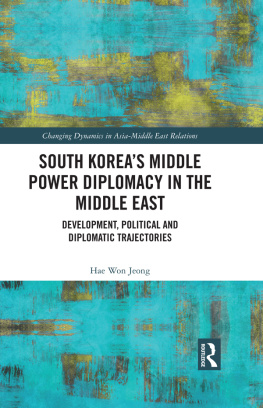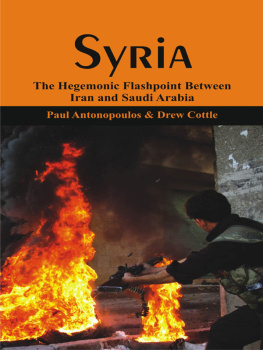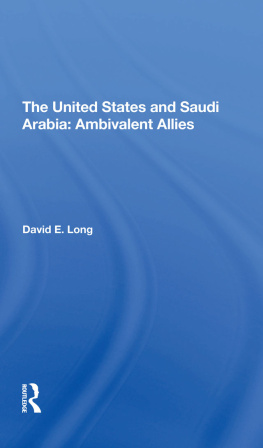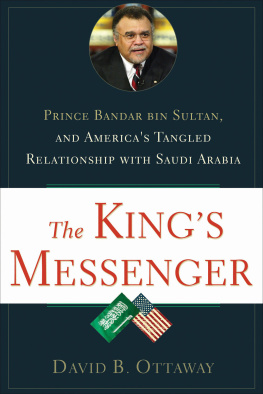Saudi Arabian Foreign Relations
In recent decades, Saudi Arabia has committed itself to playing the part of mediator in intra-national and international conflicts in the greater Middle East region. Examples include the two Saudi-introduced Arab Peace Initiatives of 1982 and 2002, mediation attempts between Algeria and Morocco in the West Sahara conflict, Iraq and Syria during the IranIraq War, and Iran and Iraq towards the end of their military conflict.
Saudi Arabian Foreign Relations provides a new insight into current studies on Saudi foreign policy and mediation in international relations. The book offers a detailed analysis of Saudi Arabias intermediary role in the intra-state conflicts in Yemen, Lebanon, and the Palestinian territories, and the successes and limitations of each. Additionally, it provides an updated examination of Saudi Arabias role towards resolution of the larger ArabIsraeli conflict.
Saudi Arabian Foreign Relations contributes to a far deeper understanding of Saudi foreign policy, and therefore will be of great interest to students and scholars of Middle East Politics and International Relations.
Ren Rieger is Chairman of the Middle East and International Affairs Research Group (MEIA Research).
Routledge Studies in Middle Eastern Politics
68 Ethnicity and Elections in Turkey
Gl Arkan Akda
69 The Kurdish Liberation Movement in Iraq
Yaniv Voller
70 Arab Regionalism
Silvia Ferabolli
71 The Kurdish Issue in Turkey
Edited by Zeynep Gambetti and Joost Jongerden
72 The Turkish Deep State
Mehtap Syler
73 Koreans in the Persian Gulf
Shirzad Azad
74 The Europeanization of Turkey
Ali Tekin and Aylin Gney
75 Turkeys Kurdish Question
H. Akin Unver
76 The Israeli Conflict System
Harvey Starr and Stanley Dubinsky
77 Political Violence and Kurds in Turkey
Mehmet Orhan
78 The Europeanization of Turkish Public Policies
Ali Tekin and Aylin Gney
79 Diasporic Activism in the IsraeliPalestinian Conflict
Svenja Gertheiss
80 Israels Military Operations in Gaza
Marouf Hasian, Jr.
81 The Turkish AK Party and its Leader
Edited by mit Cizre and Burhanettin Duran
82 Democratic Consolidation in Turkey
Edited by Cengiz Erisen and Paul Kubicek
83 Saudi Arabian Foreign Relations
Diplomacy and mediation in conflict resolution
Ren Rieger
First published 2017
by Routledge
2 Park Square, Milton Park, Abingdon, Oxon OX14 4RN
and by Routledge
711 Third Avenue, New York, NY 10017
Routledge is an imprint of the Taylor & Francis Group, an informa business
2016 Ren Rieger
The right of Ren Rieger to be identified as author of this work has been asserted by him in accordance with sections 77 and 78 of the Copyright, Designs and Patents Act 1988.
All rights reserved. No part of this book may be reprinted or reproduced or utilized in any form or by any electronic, mechanical, or other means, now known or hereafter invented, including photocopying and recording, or in any information storage or retrieval system, without permission in writing from the publishers.
Trademark notice: Product or corporate names may be trademarks or registered trademarks, and are used only for identification and explanation without intent to infringe.
British Library Cataloguing in Publication Data
A catalogue record for this book is available from the British Library
Library of Congress Cataloging in Publication Data
A catalog record for this boo has been requested.
ISBN: 978-1-138-67850-7 (hbk)
ISBN: 978-1-315-55890-5 (ebk)
Typeset in Times New Roman
by Wearset Ltd, Boldon, Tyne and Wear
To Julia
Contents
I should like to use this opportunity to thank all those people whose support was essential in the process of writing this book. First of all, my particular gratitude is owed to my dear friend, Saud Al Tamamy, who graciously supported me in innumerable ways throughout the whole research and writing process. I am deeply indebted to my mentors Gerd Nonneman and Tim Niblock, who guided me through my PhD research and who gave me valuable advice with respect to my first postdoctoral research project, the result of which is the book at hand.
I am also indebted to the numerous individuals in Saudi Arabia and abroad who so generously took time out of their busy schedules to share with me valuable insights on Saudi history, society, culture, and most importantly foreign policy. As several of these individuals prefer to remain unanimous, I unfortunately cannot mention all of them by name. Nonetheless, my gratitude is owed to them as much as it is owed to the following people: Awadh Albadi, Salih Al Khathlan, Abdullah Al Otaibi, HRH Prince Turki Al Faisal Al Saud, Asaad Al Shamlan, John Duke Anthony, H. E. Abdullah Bishara, Barbara Bodine, Steven Bondy, Raymond H. Close, Anthony Cordesman, Walter L. Cutler, Sean Foley, Charles W. Freeman, F. Gregory Gause, Dieter W. Haller, Anne Joyce, Allen L. Kieswetter, W. Patrick Lang, Thomas W. Lippmann, Richard W. Murphy, James A. Placke, Steven A. Seche, Mark Thompson, and Judith S. Yaphe.
Last but surely not least, my gratitude is, as always, owed to Julia.
1
Introduction
For decades Western governments, such as those of the United States, the United Kingdom or Germany, have regularly emphasized the importance of the Kingdom of Saudi Arabia as a strategic partner and anchor of economic and regional stability. No political disagreement or conflict of interests has permanently strained political or economic relations between key Western states and the Saudi leadership. However, there are few states whose foreign policies Western media and societies meet with as much reflexive aversion and disapproval as that of Saudi Arabia. The 1973/74 oil embargo and the continuous refusal to enter into a peace treaty with Israel are widely considered proof of the Kingdoms anti-Semitism (as Arabs are Semites as well, more adequate terms would be anti-Judaism or anti-Zionism); the support of the Afghan mujahidin in the 1980s and the Taliban in the decade that followed is seen as ostensible evidence of the Saudi leaderships desire to export religious and cultural extremism; and the alleged Saudi counterrevolution in the course of the Arab uprisings is taken as the ultimate demonstration of both the Saudi leaderships anti-democratic, sectarian campaign and its aspiration for uncontested leadership in the Arab world. Whenever Saudi Arabia becomes active in foreign policy, the natural reaction of Western media, societies, and parts of their political elites seems to be that of skepticism and cynical rejection. Any Saudi international action is seen as another piece of the puzzle of the Kingdoms alleged perfidious plan to impose its fundamentalist Wahhabi ideology on societies beyond its borders. Accordingly, whenever Saudi Arabia endeavored to mediate in international and intra-national conflicts, Western observers inevitably questioned the Kingdoms motivation and speculated on its true objectives.
Setting incorrect preconceptions straight is a difficult task, particularly when they have been burnt deeply into the minds of people. One is destined to draw significant criticism for swimming against the current instead of repeating and adding to the established narrative. Nonetheless, by taking a fresh analytical view, the book at hand challenges the biased picture most Westerners, and indeed many Middle Easterners as well, have of Saudi foreign policy. Based on a general analysis of Saudi foreign policy objectives, the study will mainly focus on Saudi Arabias role as a mediator in international relations.

